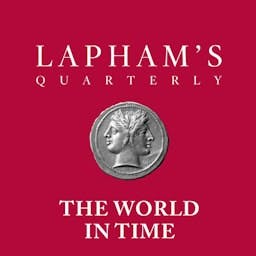

The World in Time / Lapham’s Quarterly
Lapham’s Quarterly
Donovan Hohn, the acting editor of Lapham's Quarterly, interviews historians, writers, and journalists about books that bring voices from the past up to the microphone of the present. New episodes are released weekly.
Episodes
Mentioned books

14 snips
Aug 29, 2025 • 60min
Episode 12: James Marcus on Emerson and Melville
Join writer and biographer James Marcus, known for his insightful work on Ralph Waldo Emerson, as he explores the dynamic relationship between Emerson and Melville. The discussion unveils the contrasting literary styles of these titans and delves into Emerson's multifaceted identity, echoing his transcendentalist beliefs. Marcus highlights the importance of reevaluating timeless quotes, while also exposing the philosophical tensions in Melville's characters. The conversation culminates in an examination of individualism versus community, showcasing Emerson's evolving understanding of interconnectedness.

Aug 22, 2025 • 1h 21min
Episode 11: Matthew Hollis on "The Seafarer"
Matthew Hollis, a poet and translator of The Seafarer, shares insights on this poignant 10th-century Anglo-Saxon poem. He discusses the emotional turmoil of isolation at sea and the timeless themes of belonging and moral choices, resonating deeply with modern audiences. The conversation explores the poem’s improbable survival and its rich soundscape, enhanced by multimedia elements. Hollis also reflects on the challenges of translating ancient poetry while preserving its musicality and depth, emphasizing the cultural significance of the sea in Anglo-Saxon society.

Aug 8, 2025 • 42min
Episode 10: "Loomings," with Francine Prose
Francine Prose, the editor-at-large of The Quarterly and acclaimed author, dives deep into Melville's Moby Dick, particularly its iconic first chapter, 'Loomings.' She passionately argues why 'Call me Ishmael' is a masterclass in narrative authority. Prose and host Donovan Hohn explore Ishmael’s complex character, the influence of American sermons on Melville's style, and the themes of solitude, freedom, and friendship illustrated through nautical imagery. Their riveting analysis reveals layers of meaning that resonate with both literary heritage and contemporary relevance.

Aug 1, 2025 • 1h 5min
Episode 9: Roger Berkowitz
Roger Berkowitz, a writer and academic director at the Hannah Arendt Center, takes a deep dive into the thoughts of Hannah Arendt and Henry David Thoreau on civil disobedience. He distinguishes between living under tyranny versus totalitarianism, emphasizing the necessity of political action for freedom. Their discussions illuminate the contrast between individual dissent and collective action. Berkowitz also reflects on Arendt's critical views of American politics and the role of citizen assemblies in promoting active democracy.

Jul 25, 2025 • 1h 32min
Episode 8: Herman Melville, Extracted (with Wyatt Mason)
Join writers Wyatt Mason, Richard J. King, and Aaron Sachs as they dive deep into the layers of 'Moby Dick.' Wyatt reflects on the emotional connection readers have with the whale, while Richard discusses Ahab’s tumultuous relationship with the sea. Aaron analyzes Melville’s influence on modern literature and environmental narratives. The conversation touches on teaching Melville to incarcerated students, showcasing the novel’s timeless relevance. Explore the intricate blend of humor and seriousness in Melville’s work, making it resonate with contemporary challenges.

Jul 18, 2025 • 1h 31min
Episode 7: Daniel Mendelsohn and Lewis H. Lapham
Daniel Mendelsohn, a writer and translator known for his insights into classical literature, shares his journey of translating The Odyssey, exploring themes of identity and transformation. He reflects on how Odysseus, after years away, grapples with reconciling his past self with who he's become. Lewis H. Lapham, founder of Lapham's Quarterly, adds depth with nostalgic reflections on Moby-Dick and his seafaring experiences. Together, they draw fascinating parallels between ancient texts and modern life, unpacking the enduring impact of literary journeys.

Jul 11, 2025 • 1h 19min
Episode 6: Justin Smith-Ruiu and Rachel Richardson
In this engaging discussion, scholar-essayist Justin Smith-Ruiu, an expert on psychedelics and philosophy, explores how drugs transitioned from cultural artifacts to modern commodities. He dives into the history of consciousness and auto-experimentation. Poet Rachel Richardson reflects on motherhood and the powerful imagery of California, particularly in light of environmental challenges. Their dialogue weaves through the emotional fabric of music, art, and shared human experiences, shedding light on the complexities of identity and perception in a transforming landscape.

Jul 4, 2025 • 1h 40min
Episode 5: Ben Tarnoff and John Jeremiah Sullivan
Ben Tarnoff, a writer and technologist known for his book on Mark Twain, dives into Twain's literary evolution in 1860s San Francisco, highlighting how the frontier experience shaped his voice and laid the groundwork for stand-up comedy. Meanwhile, John Jeremiah Sullivan discusses Twain's cultural revival and shares a fascinating discovery: a lost eulogy and its writer, Adele Amelia Gleason. Together, they explore the intertwining of humor, literary ambition, and the rich tapestry of American identity forged in that vibrant era.

Jun 27, 2025 • 1h 30min
Episode 4: Kira Brunner Don and Nathan Brown
Kira Brunner Don, former executive editor of Lapham’s Quarterly and current editor of Stranger’s Guide, shares her insights on the power of storytelling, especially the importance of local voices in journalism. Nathan Brown, a Concordia University professor and translator of Baudelaire, delves into the complexities of translating poetry and the historical significance of his recently translated poem, "Introspection." Both guests explore the intersection of art and journalism, reflecting on the challenges and nuances of storytelling during conflict.

Jun 20, 2025 • 47min
Episode 3: Francine Prose
In this captivating discussion, Francine Prose, author of 22 novels including *1974: A Personal History*, dives into her nostalgic memories of Nixon-era San Francisco. She reflects on vibrant communal living and the pre-tech spirit of the city, contrasting it with the current landscape. Prose shares her idealistic youth, from protesting the Vietnam War to her husband’s audacious climb of the Pentagon. She also explores the eerie parallels between her experiences and themes in Hitchcock's *Vertigo*, weaving a narrative rich in cultural and personal transformation.


